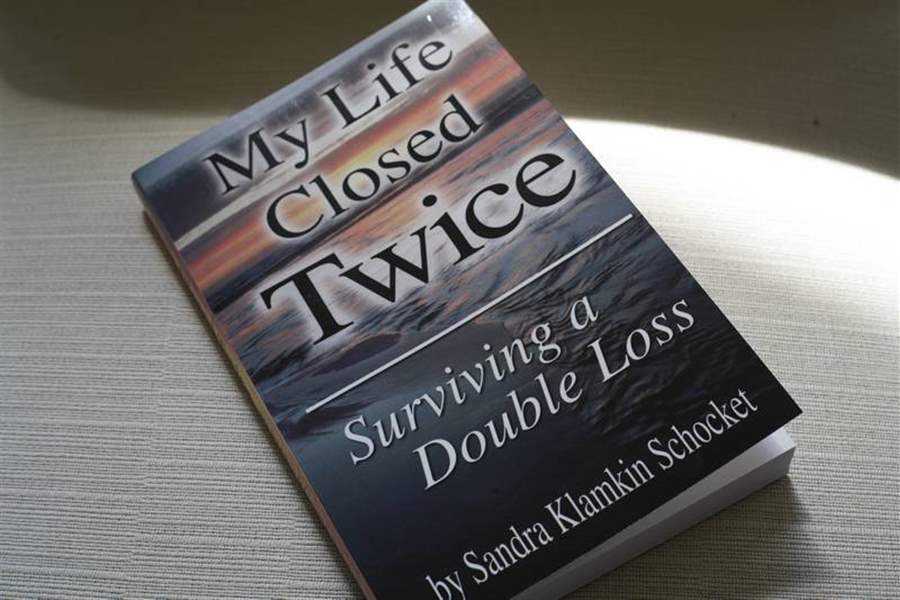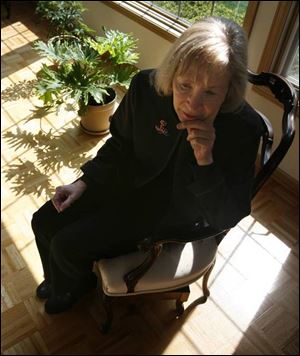
Writing helped wife and mother cope with double loss
5/21/2006
Sandra Klamkin Schocket's My Life Closed Twice: Surviving a Double Loss (Monroe Press, 256 pages, $14).

Sandra Klamkin Schocket
Jay Schocket died on a Friday morning in December, 1994, at the age of 59. His 30-year-old son, Barry, died unexpectedly the next morning.
And the stunned wife and mother they left behind wondered if she would ever really live again.
"Would I laugh and sing, enjoy a good meal or a funny movie? Would I ever climb out from under this tremendous weight of grief that had settled upon me...?" Sandra Klamkin Schocket writes in her book, My Life Closed Twice: Surviving a Double Loss (Monroe Press, 256 pages, $14).
More than a decade later, sitting in her airy living room in suburban Toledo, she answers her own question: "Of course," says Ms. Schocket, 70. "You adjust and you move on.... You make a new life."
She adds that, "It's always with you, but not the way it is in the beginning. In the beginning, it's like a physical pain."
Her journey of moving on brought her to northwest Ohio in 2002 from Morris County, New Jersey, where Jay died during what was expected to be a routine angioplasty following a heart attack. Barry, an athlete and nonsmoker who had appeared healthy, died the next morning as the result of an enlarged heart.
Ms. Schocket, a lifelong East Coast resident, moved here to be close to her surviving son, Andrew, and his wife, Deborah - both are on the faculty at Bowling Green State University - and their daughter Sophie, now 3 1/2. The family lives in Bowling Green, Ms. Schocket in Holland.
Her book, "about how an ordinary person survives extraordinary tragedy and goes on to build a new life," was published in 2003 by BWD Publishing of Toledo and re-issued by Monroe Press in October, 2004, with a different cover and more photos. My Life Closed Twice - its title based on an Emily Dickinson poem - is available at the Toledo-Lucas County Public Library and can be purchased through bookstores or online from Amazon.com and Atlasbooks.com or via the author's Web site, www.multipleloss.net.

Sandra Klamkin Schocket's My Life Closed Twice: Surviving a Double Loss (Monroe Press, 256 pages, $14).
Like Joan Didion's The Year of Magical Thinking (Alfred A. Knopf, 2005, $23.95) about the death of Ms. Didion's husband, writer John Gregory Dunne, Ms. Schocket describes her reactions to sudden, wrenching loss. But the two differ in that while Ms. Didion writes of coping simultaneously with her only child's serious illness (her daughter later died), Ms. Schocket's older son died within 24 hours of his father.
"Just as no death is like any other, Barry's death did not change my world in the same way as Jay's," Ms. Schocket writes in My Life Closed Twice. "Although living without my husband continues to diminish my life, I have found systems and methods that allow life to continue, that enable me to go on without wallowing in perpetual self-pity. In some ways, I have become a stronger and better person. But I have not yet found the path that leads to acceptance of Barry's loss. ... Losing a child puts one into a world apart."
Such reflections give the book an emotional heft that she hadn't planned when she began writing it around 1997. "It started out as a 'how-to' book," Ms. Schocket explains.
Drawing on her background as a certified career counselor who had led hundreds of workshops for people who had lost their jobs, she had planned to write a guide for those who had suffered a multiple loss. After telling the story of losing Jay and Barry, she would move on to such topics as how she returned to work, settled the estate, found sources of comfort and support, coped with the various stages of grief, and learned "to be single."
But friends who read sections of the book as she wrote them encouraged her to infuse it with more of her own feelings, she says. And, although she had experience as a freelance writer, she struggled with the structure of the book - specifically, the transition from her personal experience of the first four chapters to the "how-to" portion she planned to start in Chapter 5.
"I must have written that 10 times," she says. An editor friend suggested she move a section about Barry's childhood from that chapter to an earlier chapter, improving the flow and leading eventually to a finished book that weaves together her experience and observations with those of others she interviewed who suffered multiple loss, research on mourning, and her advice and encouragement.
People ask if she wrote the book as a way of working through her grief.
"I didn't think of it that way," she says. "I wanted to help other people. I really wrote it with that in mind."
Though it wasn't her intention, "I think probably along the way it helped me as much as anyone else," Ms. Schocket says.
Her research in 1997-1998 yielded little agreement on the definition of multiple loss, she recalls. Hoping to contact other people with similar experiences, she posted a message at a grief site she found on the Internet.
"Within a week I must have had 25 responses - and this was when the Internet was nothing like it is now," Ms. Schocket says. "A lot of them are in the book."
Again, there was a wide variety of what people perceived as "multiple loss," much different than her own. One woman who put herself in that category told of a string of deaths that spanned 20 years.
"Most people would have resolved the earlier deaths," Ms. Schocket says, "but some people see this as a continuum."
Much of the book will resonate with anyone who has suffered loss of any kind - a job, a beloved pet, a home, a dear friend, or a parent.
Reflecting on her mother's death in 1990, four years before Jay and Barry died, she writes: "There are so many questions I wished I had asked her."
Ms. Schocket tells of going to a small New Hampshire town where they had spent summers when she was a child. She drives up and down the streets looking for the boarding house where they had stayed, but can't identify one with any certainty.
"My mother would have known for sure. This may seem like a superficial reason for missing a mother, but as with all loss, it is sometimes the small thing whose absence is most noted when it is gone. We suddenly awake to find portions of our past erased with no way of retrieving a name, a place, a saying, a memory. So much is left undone and so much unsaid."
Today, Ms. Schocket's new life is full: she spends time with her granddaughter, serves as a docent at the Toledo Museum of Art, swims, travels, walks in the Metroparks, and sings in the choir at the Temple-Congregation Shomer Emunim in Sylvania.
She's taking her own advice: "Find things that make you feel better," she says. "You've got to do something that will get you off the couch."
Contact Ann Weber at: aweber@theblade.com
or 419-724-6126.